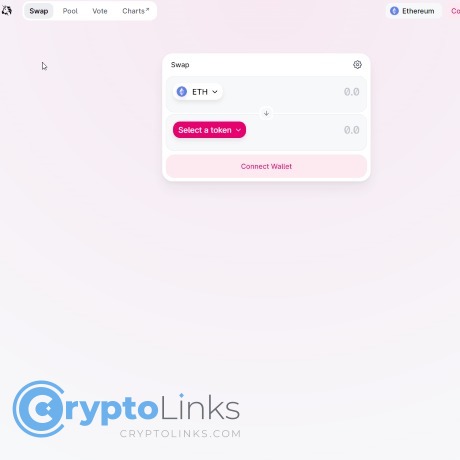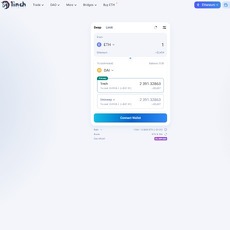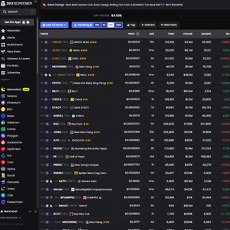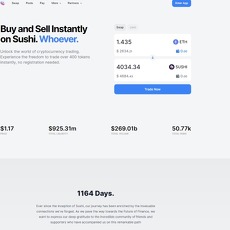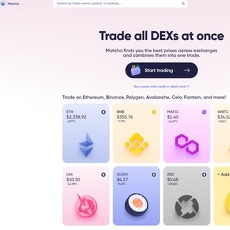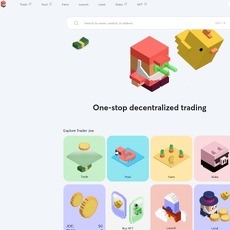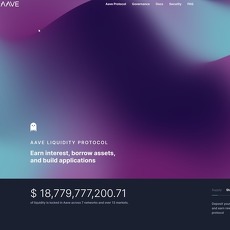Uniswap Review
Uniswap
uniswap.org
Uniswap: Is It Worth Your Time and Crypto? Honest Review + FAQs
Have you ever found yourself staring blankly at countless decentralized exchanges (DEX), wondering which one might actually deliver a smooth experience without unexpected headaches? Trust me—I've been there, and with so many new and shiny platforms emerging daily, it's pretty easy to get overwhelmed. One name that's consistently on everyone's lips (especially recently) is Uniswap. But is it really the gem that crypto enthusiasts make it out to be?
In this article, we'll look deeper into why Uniswap has become the talk of the town—and more importantly, we'll tackle head-on the issues users frequently encounter while using it. Let's seriously discuss what's holding some crypto fans back from wholeheartedly trusting Uniswap.
What Issues Do Crypto Enthusiasts Have With Uniswap?
Even though Uniswap is praised repeatedly as one of the top decentralized exchanges in the crypto world, it's far from flawless. It can feel quite frustrating when you're new—or even experienced—and you face unexpected hurdles. Here are some common problems that crypto users frequently run into when using Uniswap:
- High Transaction Fees (Gas Fees): Ethereum-based transactions are notorious for their high costs during peak network traffic. Imagine paying $30+ just to swap tokens—that's often reality on Uniswap at busy times.
- Risk of Scam Tokens: Since anyone can list a token on Uniswap without verification, fraudsters regularly create scam tokens designed to steal your crypto. This openness means you must be exceptionally cautious.
- Slippage Frustrations: Ever tried making a transaction thinking it'll cost one amount, only to end up paying much more? Slippage or sudden price shifts during confirmations can be particularly annoying and costly.
- Failed Transactions: A surprising number of Uniswap users complain regularly of transactions that randomly fail despite being pretty sure they did everything right. Sometimes you pay gas fees anyway, adding insult to injury.
Sounds scary or annoying at first glance, doesn't it? But wait–don't hit that back button just yet. If these concerns are bothering you, stick around for a moment because there's more to the picture.
Don't Worry—I'll Offer a Clear Solution and Insights
I understand that these issues might make you a bit hesitant about hopping onto the Uniswap train. But what if I told you that with the right approach and knowledge, the vast majority of users overcome most of these hiccups?
You're not alone in facing these problems, and luckily, there are straightforward strategies to reduce these risks dramatically. I'll offer concrete advice and actionable solutions throughout this review, sharing exactly how you can:
- Efficiently handle gas fees so you don't break the bank while using Uniswap.
- Quickly identify and dodge scam tokens before they're able to harm your wallet.
- Understand and manage slippage, ensuring a smoother trading experience.
- Minimize transaction failures by tweaking simple settings before clicking "Swap."
I won't sugarcoat anything—but I promise you'll have clear insights every step of the way. You'll learn how to sidestep unnecessary pitfalls that many beginners (and even experienced crypto enthusiasts) struggle with.
Are you curious about what exactly Uniswap is and why crypto fans are so excited about it despite these issues? Keep reading—I've got you covered next.
First Things First: What's Uniswap, Anyway?
Let's clear something up right from the start because I get it: crypto discussions can easily get confusing. You've likely heard "Uniswap" thrown around a lot as the go-to decentralized exchange (DEX), but what exactly does that mean for you, as a user? Well, let's simplify this once and for all.
A Quick Definition of Uniswap
In plain language, Uniswap is a decentralized crypto exchange where you can swap Ethereum-based tokens without needing to deal with centralized companies or complex ID verification. Think of it as a vast, automated crypto market open 24/7, driven purely by computer code known as smart contracts. No central authority, no KYC bureaucracy—just you, other crypto traders, and a smooth swap process.
What's revolutionary about Uniswap compared to centralized exchanges like Coinbase or Binance? Honestly, it boils down to simplicity, decentralization, and transparency. Uniswap lets almost any ERC-20 token be traded instantly, making it particularly useful for those fresh tokens you can't find on big crypto exchanges. Instead of matching buyers and sellers through a centralized order book, Uniswap relies entirely on something called liquidity pools—but we'll explore that further in a later segment.
"Centralization is natural because it's efficient. But decentralization ensures longevity." – Vitalik Buterin
This quote from Ethereum's founder sums up precisely why platforms like Uniswap exist: longevity, fairness, and resistance against censorship. It's the beauty of decentralization: no middlemen, no delays, no interruptions.
Understanding the UNI Token
Now, let's chat about UNI, the native token of the Uniswap platform, because it often sparks curiosity. UNI isn't just another fancy token sitting idle in your wallet—it's a governance token. Holding UNI tokens empowers you with voting rights to help shape the future direction of Uniswap—everything from fee adjustments to protocol upgrades.
- Why would you hold UNI? Simple: You believe in the growth and continued popularity of Uniswap, so holding UNI gives you both influence over development and possibly a financial upside as the adoption increases.
- How do you earn or obtain UNI tokens? Great question! Many users received UNI free of charge during the famous Uniswap airdrop (one of crypto's most exciting events), or you can simply purchase it directly using Uniswap or other major crypto exchanges like Binance or Coinbase.
- Does UNI have utility beyond governance? Currently, its primary role is governance. However, with Uniswap’s rapidly evolving ecosystem, future developments might add further functionality and use cases.
At the end of the day, using Uniswap and holding UNI tokens isn’t just another mundane crypto activity—it’s embracing crypto ideals: decentralization, innovation, and community influence.
Curious about what else Uniswap has to offer or if it might actually suit your trading style and personality? Hold tight—I'm about to reveal some crucial insights about the upsides and downsides of using Uniswap next. Want to know if this popular decentralized exchange is truly the best pick for you? Let's find out.
Pros and Cons of Using Uniswap
Let’s talk openly—like two crypto buddies sharing about their DEX experiences. Is Uniswap really as good as everyone says? Or does it hide pitfalls you just haven't run into yet? Let's break it down honestly: I'll highlight the standout strengths and also tell you about some serious downsides.
The Benefits That Make Uniswap Stand Out
People love Uniswap for a bunch of great reasons. If you've seen crypto Twitter for even 10 minutes, you're probably familiar with the hype. But let's pinpoint exactly why this decentralized exchange attracts millions of crypto users:
- No Gatekeeping (Permissionless Trading): Unlike centralized exchanges where your token has to pass approval processes, Uniswap lets anyone list tokens. This creates a democratic, open environment that's especially appealing if you're interested in newer or niche coins.
- Ease-of-Use for Everyone: Nothing kills enthusiasm quicker than overly complex interfaces. Uniswap nails simplicity, even for crypto beginners. Connecting your wallet and swapping assets takes mere minutes, without all the KYC procedures typical to centralized exchanges.
- Liquidity Pools (Earn While Holding): Uniswap pioneered liquidity pools, letting everyday crypto enthusiasts earn passive rewards by providing liquidity pairs in the marketplace. According to official Uniswap reports, liquidity providers collectively earned over $1 billion in fees within just a few years of operation.
- Huge Community Support: Community isn't just fluff—it's everything in crypto. Uniswap is deeply embedded in crypto culture, with robust support from loyal users. Look around crypto forums, Reddit, or Twitter—the feedback and participation levels are unmatched among decentralized exchanges. That means quicker advice, more tutorials, and active discussions whenever needed.
"In crypto, great tech counts—but community trust matters even more."
The Drawbacks You Need to Be Aware Of
Okay, so you're excited. But like your friend who always gives you truthful (sometimes painful) advice, let me also share some serious concerns:
- Potential Scam Tokens: Because anyone can list tokens without oversight, scams pop up often. You've probably heard stories (or perhaps experienced them yourself!) of rug pulls or malicious tokens that drained wallets with deceptive contracts. If you're not careful and thorough with your own research, you can lose assets fast.
- High Ethereum Gas Fees: Ethereum fees can spike during heavy market activity, becoming prohibitively expensive for small trades. For example, at the peak of network congestion sentiment in August 2021, average fees for a swap transaction jumped significantly—sometimes above $50 for a simple trade. Ouch!
- Slippage Issues (Trades Not Always Executed): Ever clicked a swap and had the transaction fail unexpectedly—or even worse, execute at a significantly worse price than expected? Slippage occurs frequently due to price changes between initiating and completing a trade, especially in volatile markets or with lower-liquidity pairs.
These downsides aren't deal breakers, but they definitely aren't trivial either. Approaching Uniswap without awareness can mean unnecessary frustration or financial loss.
Now you're probably wondering: "How can I avoid falling for scam tokens or losing money on failed transactions?" Don’t worry—I’ve got answers to exactly those concerns coming up next. Keep reading and we'll tackle these common Uniswap questions head-on.
Addressing Frequently Asked Questions about Uniswap
Let's be honest, decentralized exchanges like Uniswap can be pretty confusing at first. I understand you might have some burning questions about Uniswap, especially given all the chatter online. I checked out the most frequently asked questions crypto enthusiasts have, and I'm here to answer these clearly, honestly, and in a way you can really relate to. Let's tackle them:
What's the Main Disadvantage or Risk Associated with Uniswap?
We all love freedom and open decentralization—but let's face it, freedom also means there's no gatekeeper. The biggest risk you'll face while using Uniswap is that literally anyone can list a token. Cool, but risky. Why is this risky? Because scams can pop up easily. A sketchy developer might create a flashy token, hype it up online, then run off with your funds—this is called a "rug pull," and unfortunately, it's very common.
You definitely don't want to be the next victim. Here's how you avoid it:
- Do Your Research: Always double-check project details, social media reputation, and audits before swapping your hard-earned crypto into something unknown.
- Use Token Verification Tools: Websites like Token Sniffer can quickly help you determine if a token has red flags or is likely safe to swap into.
- Check Liquidity Pools: If the liquidity for a token seems suspiciously low, or only a handful of wallets own most of it, proceed cautiously—it's an early sign of potential scams.
"In crypto, trust the blockchain, not random promises."
Can the IRS Track Uniswap Transactions?
Good question—honestly, many people think using decentralized exchanges means they're sort of invisible. Let me bust that myth. Uniswap itself does NOT report your transactions to the IRS. However, here's the kicker: the Ethereum blockchain, which Uniswap runs on, is completely public and transparent. With enough effort, any exchange or even the IRS can track your wallet address and connect transactions to your identity.
A recent CNBC article highlighted that the IRS has been stepping up their crypto-tracking game over the last year. Long story short: yes, authorities can potentially trace these transactions, and crypto owners are required to accurately report their trades and gains to avoid tax trouble down the road.
- Stay organized: always keep clear records of your trades and swaps to simplify tax reporting.
- Consider Tax Software: Tools like TokenTax can save you heaps of trouble when tax season rolls around.
Why Do Some Transactions Fail on Uniswap?
This might just be the most common question I've run into because transaction failures are definitely a frustration every crypto trader has encountered at some point. Here's what's happening—most transaction failures on Uniswap are due to something called "slippage."
Slippage means a price change happens after you're about to hit the "swap" button. When there's major price volatility or low liquidity, your order suddenly isn't viable at the original set price, and it simply fails.
To reduce annoying transaction failures, try these quick tips:
- Adjust your slippage tolerance slightly higher: Sometimes just bumping it up from 0.5% to 1% can make a big difference.
- Avoid peak network traffic: Heavy usage means higher volatility and increased chance of failure. Pick off-hours for smoother transactions.
- Consider using higher Ethereum gas (transaction fees): If speed is crucial, higher gas fees ensure your transaction goes through faster.
Trust me, knowing this simple trick can drastically reduce your frustration. But here's something curious: ever wondered how liquidity actually works behind Uniswap scenes, and why it's crucial for your trading success? Keep reading—because understanding liquidity pools changed how I trade forever. I'm excited to walk you through it in the next section.
How Does Uniswap's Liquidity Pool Actually Work?
If you're curious about how people earn passive income through crypto while enabling easy trades for thousands of tokens, then Uniswap's liquidity pools are your golden ticket. You've probably heard the term before—but how exactly do liquidity pools work, and is it something that could bring value to your crypto journey?
A Simple Explanation of How Liquidity Pools Function
Imagine Uniswap like a marketplace that needs products (tokens!) on its shelves to facilitate quick transactions. That's exactly what liquidity pools do: they are token reserves deposited by users who help keep trading smooth and efficient. These users, known as liquidity providers (LPs), deposit two tokens—for example, Ethereum (ETH) and USDC—into the pool in equal value amounts.
Here's the catch: whenever someone uses Uniswap for trading, they pay a small fee. Those fees don't vanish into thin air—they are proportionally distributed among the liquidity providers as rewards. So, essentially, by providing liquidity, you become an essential part of the ecosystem, earning passive rewards as trades occur.
"Liquidity pools are the lifeblood of decentralized finance—making your crypto useful all while generating returns for yourself."
But be aware: rewards from fees aren't always guaranteed profits. To better grasp this strategy, let's explore exactly how you can join in and what risks are involved.
How Can I Provide Liquidity?
The best part—it's straightforward and doesn't need special tech skills:
- Firstly, head to the official Uniswap website and select the "Pool" section.
- Click “New Position” and choose the tokens you’d like to provide. Remember, you have to deposit two different tokens in equal value.
- Approve each token for trading (which, heads-up, incurs a small Ethereum gas fee).
- Confirm your deposit, and voila! You're now officially a liquidity provider.
After that, your liquidity tokens act as evidence of ownership in the pool, which you can later redeem to withdraw your share and earned fees.
Understanding Impermanent Loss—What You Should Know
Although earning passive crypto income sounds promising, there are crucial factors you must understand, especially the looming challenge of impermanent loss.
Impermanent loss can happen because of fluctuating token prices between the time you deposit and withdraw your funds. Basically, it's a difference that occurs when one token in your deposited pair increases or decreases significantly compared to the other. Sometimes, it means that holding onto the tokens separately could've made you more than depositing them into the liquidity pool.
This doesn’t always mean you've "lost" money—it just means you might earn less than simply holding the tokens without providing liquidity. To put this into perspective, a study by Bancor (one of Uniswap's competitors) found that volatility can affect returns significantly, especially during market swings, making it important for Liquidity Providers to carefully select their token pairs based on price stability.
Should this scare you off from providing liquidity? Not necessarily. Being informed means you can smartly choose stable coins or tokens with closely aligned prices to dramatically reduce your risk.
Now that you've learned a key aspect of participating in Uniswap, what about other competitors like SushiSwap or PancakeSwap—how do they stack up against Uniswap? Is Uniswap still your best bet, or could you actually do better elsewhere?
Comparing Uniswap to Other Popular DEX Platforms
Choosing the right decentralized exchange (DEX) can feel like picking the right cryptocurrency—tons of excitement yet plenty of uncertainty. I know because I've been there! Two major competitors you might hear about most often alongside Uniswap are PancakeSwap and SushiSwap. But how do they actually compare? Let's clear things up quickly.
Why Users Prefer Uniswap (And When Another DEX Might Be Better)
I often chat with crypto enthusiasts and traders who tell me they lean toward Uniswap primarily for three reasons:
- Liquidity & Token Variety: Uniswap has unmatched liquidity and supports the Ethereum ecosystem with a huge selection of tokens. For Ethereum-based projects and tokens, Uniswap's sheer number of trading pairs makes it the go-to choice.
- Simplicity: With its straightforward, no-nonsense interface, Uniswap's ease-of-use is highly appealing—especially if you're new to decentralized exchanges and don't want to deal with complex features.
- Trust and Brand Reputation: Uniswap has a solid track record. Thanks to its pioneering role in DeFi, it commands trust from a large community of crypto users who want a reliable trading experience.
"Innovation distinguishes between a leader and a follower." – Steve Jobs
This perfectly captures why lots of users stick with Uniswap—it has consistently led DEX innovations, giving traders like me a sense of comfort that alternatives sometimes don't match.
But hold on! Does this mean Uniswap's the absolute best in every situation? Not necessarily.
- High Ethereum Gas Fees: Sometimes, Uniswap's reliance on Ethereum can make painful fees inevitable, especially if the Ethereum network is congested. If you're trading smaller amounts frequently, PancakeSwap (run on Binance Smart Chain) could save you noticeably on fees.
- Attractive Rewards Elsewhere: Platforms like SushiSwap or PancakeSwap often provide incentives through neat reward programs or yield farming opportunities. If you're into maximizing passive gains in addition to trading, you might want to check these options.
Fees, Speed, Usability: A Simple Comparison
Here's how Uniswap quickly compares against PancakeSwap—one of its closest rivals—on the essential points of fees, speed, and usability:
- Fees: Uniswap operates on Ethereum, so transaction fees tend to be higher, potentially pricing out smaller transactions. PancakeSwap, relying on Binance Smart Chain, has notably lower transaction fees, often costing just cents per swap.
- Speed: Transactions on Ethereum (Uniswap) may take anywhere from seconds to several minutes, depending on network conditions and fees paid. PancakeSwap typically processes transactions quicker due to Binance Smart Chain's faster block generation times—with most trades often confirmed within seconds.
- Usability: Both platforms are quite user-friendly, but Uniswap's minimalistic layout might attract users looking for simplicity. PancakeSwap provides some extra bells-and-whistles like gamified yield farming and lottery options, attracting users looking for broader functionality and engagement beyond simple swapping.
Now you see why many crypto followers stick with Uniswap, yet others branched out toward PancakeSwap or SushiSwap; It really boils down to your own needs—trading habits, cost sensitivity, and personal preferences. But wait a minute, there's another critical aspect everyone worries about with DEXs: security and privacy. How safe is your crypto, really? Is your digital wallet and hard-earned cryptocurrency genuinely secure on Uniswap?
Keep reading, because in the next part, I'll reveal important insights and actionable tips to safeguard your crypto assets while trading on Uniswap!
Uniswap Security and Privacy: Is Your Crypto Safe?
One major worry we crypto enthusiasts often share is the security of decentralized exchanges like Uniswap. After all, nothing ruins your crypto adventure quicker than security headaches—am I right? Let's cut through the noise and get straight to whether Uniswap keeps your assets safe and sound.
Key Security Features Built into Uniswap
First, let's talk smart contract safety. Uniswap runs on Ethereum-based smart contracts, so the code itself is transparent, publicly available, and heavily scrutinized by the community. This helps keep scams and hidden security vulnerabilities at bay—anyone can examine these smart contracts, and hundreds of skilled blockchain developers frequently inspect the platform.
- Public Audits: Uniswap smart contracts undergo regular third-party audits from reputable blockchain security firms like OpenZeppelin and Trail of Bits. Independent verification is a must, and Uniswap keeps things transparent by making audit reports easily accessible.
- No Deposit Custody: Uniswap does not collect or store your crypto assets—transactions occur directly from your wallet through smart contracts—removing centralized custody risks we've seen with hacks at exchanges like Mt. Gox and QuadrigaCX.
- Decentralization Equals Safety: By design, decentralized exchanges eliminate single points of failure you'd experience with a centralized platform. No central database means fewer angles for hackers to exploit.
But even with solid smart-contract security, the platform isn't impenetrable—user errors or fake tokens in liquidity pools occasionally pop up. So, what can you do to stack those odds in your favor?
Steps You Should Take for Extra Security
"An ounce of prevention is worth a pound of cure." — Benjamin Franklin
Franklin probably wasn't into crypto—but his wisdom applies perfectly here. Here's how you add that important extra layer of safety:
- Use a Hardware Wallet: Keep your private keys offline and separated from your desktop device. Solutions like Trezor or Ledger hardware wallets are your best security buddies when trading on decentralized platforms like Uniswap.
- Always Verify Tokens First: Because anyone can list tokens, Uniswap occasionally attracts scammers. Always verify the token's smart contract address through trustworthy sites like Etherscan or official project channels before making a swap.
- Bookmark Trusted Sites: Phishing scams are common—those sneaky scammers replicate Uniswap's website to steal sensitive data. Bookmark the official Uniswap Web App, double-check URLs carefully, and NEVER share your private keys or seed phrases with suspicious sites or unsolicited support.
- Consider Extra Safety Add-ons: Browser extensions like Metamask help identify potential scams and security issues before your wallet interacts with smart contracts. Stay alert, keep tools updated, and trust only verified sources.
Staying protected in crypto isn't just luck, it's about being proactive and cautious. Curious what other resources can help boost your Uniswap experience even further? Stick with me, because next I'll show you practical, helpful resources that'll ensure your crypto journey is not only safe—but seamless too.
Helpful Resources to Get the Most Out of Uniswap
Before you jump head-first into trading with Uniswap, let me share some fantastic resources that'll clear up your doubts and boost your overall experience. Trust me, you'll thank me later!
Community and Support Channels
If you've been around crypto for a while, you'll know that having an engaged, knowledgeable community at your back can truly make a massive difference. Thankfully, Uniswap's community is one of the best out there.
These three places are my go-to spots if I need help or want to learn something new:
- Uniswap Forum: The official community forum at gov.Uniswap is where the serious discussions happen. Join to keep updated on upcoming features, governance votes, and deeper insights right from the creators.
- Uniswap on Discord: Need quick, casual interaction? Discord is incredibly active. It's perfect for immediate tech support, clarification on token pools, or just some good community vibes. Here's the link: Uniswap Discord Channel.
- Uniswap Twitter Updates: For quick updates, service changes, or platform announcements, follow Uniswap's official Twitter @Uniswap. Real-time news can give you a heads-up about essential market-moving events.
I've personally found these community channels invaluable—not just for support, but also for getting ahead-of-the-curve insights, spotting trends early, and understanding the nuances that might impact my trades and investments.
Pro tip: Staying informed and plugged into the community often means the difference between missing out and making smart, confident decisions.
Tax Resources for Uniswap Users
Let's talk about taxes real quick. They're one of the biggest headaches for crypto traders—which includes us Uniswap users. Navigating the tricky landscape of crypto tax rules can derail your excitement pretty fast.
I've got a recommendation that'll make your crypto-tax life dramatically easier: TokenTax's Uniswap-specific tax guide.
TokenTax provides clear, detailed, and straightforward information specially curated for Uniswap users, taking the pain out of crypto tax reporting. They go over important topics like calculating Uniswap trade taxes, liquidity pool rewards taxation, and common pitfalls traders might face.
- Why use TokenTax?
- Save time calculating your taxable events.
- Accurate crypto-tax reporting to avoid possible legal issues.
- Practical insights into dealing specifically with crypto swaps, liquidity pools, and yield farming taxes.
Personally, services like this have saved me countless hours and confusion, and they'll probably help you too. It's always better to tackle these issues proactively than deal with unnecessary problems down the line.
By the way, now that you've got an arsenal of resources at your fingertips—you're probably feeling more confident, right? Yet, you're probably wondering: "So, is Uniswap really worth my time and crypto—or should I explore other options?"—check out my final verdict in the next section and get your answer immediately!
Now, Should You Use Uniswap? Here's My Verdict!
If you've made it this far, I'll bet you're wondering the big question—is Uniswap worth your crypto and your precious time? Now, after discussing everything from its revolutionary approach and benefits to risks and common issues, I'll tell you straight-up what I truly think.
When Uniswap is Definitely Worth It
Uniswap is definitely a must-try decentralized exchange if you fall into one of these categories:
- Crypto explorers entering decentralized exchanges: Uniswap offers one of the simplest, cleanest, and most intuitive interfaces for those new to DeFi. Compared to many DEX alternatives—trust me, some can be quite confusing—it's straightforward enough that you'll grasp it easily.
- Liquidity pool enthusiasts: If you're excited about earning rewards from your crypto assets and comfortable with its risk-reward dynamic (including impermanent loss, which we discussed earlier), Uniswap's liquidity pools make perfect sense. High liquidity and large trading volumes translate often into attractive earning potential. In fact, in 2023 alone, Uniswap continues to dominate the DeFi market by trading volume (see DeFiLlama's latest stats).
- Traders seeking extensive token variety: If you love exploring many different tokens—especially early projects long before they're listed on centralized platforms—Uniswap definitely delivers. Its permissionless nature means thousands of emerging tokens appear regularly, providing ample opportunity for savvy traders.
When You Should Think Twice Before Using It
However, let's be real for a moment—not everyone should jump onto Uniswap without some second thoughts:
- Complete Beginners to DeFi: If you're totally new to crypto and DeFi, consider that Uniswap has a learning curve. Because anyone can list tokens, phishing and rug pulls occur occasionally. Without understanding basic security practices—like researching token addresses, using reputable wallet applications, or identifying dubious offerings—you risk exposure to scams.
- Users concerned about high Ethereum fees: Ethereum gas fees sometimes surge to painfully high levels during market volatility. For frequent transactions or small trades, this definitely becomes a dealbreaker. If you're concerned about transaction costs, exploring cheaper alternatives like PancakeSwap on Binance Smart Chain or Curve Finance on Layer 2 Ethereum solutions (like Arbitrum) might suit you better.
The key here is understanding your unique situation and your own goals. Don't rush blindly.
My Final Thoughts on Uniswap—Should You Try It?
In my opinion, Uniswap stands out as a highly reliable, innovative, and impressively user-friendly decentralized exchange. Its decentralized nature is powerful, offering you unparalleled freedom and opportunity in crypto trading, especially if you're interested in liquidity pools or trying out tokens early.
Still, nothing in crypto is completely risk-free. While its benefits clearly outweigh drawbacks for experienced crypto enthusiasts and market-savvy traders, caution is always smart. Take small, calculated steps at first—get to know the platform gradually, carefully double-check every token before swapping, and utilize security best practices I mentioned earlier (hardware wallets and token verification tools).
So yes, I do think you should try Uniswap—but do so educated, cautious, and fully aware of your personal risk tolerance. Go ahead, take that confident step in your DeFi journey, because with the right knowledge, you're already way ahead of the pack.
Ready to dive into DeFi? Explore the best DEX platforms, yield farming strategies, and security tips today at CryptoLinks.com. Your decentralized finance journey starts here!

